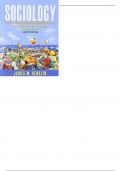, Instructor’s Manual
and
Test Bank
for
Henslin
Essentials of Sociology
Tenth Edition
Pearson Education, Inc.
Boston Columbus Indianapolis New York San Francisco Upper Saddle River
Amsterdam Cape Town Dubai London Madrid Milan Munich Paris Montreal Toronto
Delhi Mexico City Sao Paulo Sydney Hong Kong Seoul Singapore Taipei Tokyo
,Copyright © 2013, 2011, 2009, 2006 Pearson Education, Inc., publishing as Allyn & Bacon, 75
Arlington Street, Suite 300, Boston, MA 02116
All rights reserved. No part of this publication may be reproduced, stored in a retrieval system,
or transmitted, in any form or by any means, electronic, mechanical, photocopying, recording,
or otherwise, without the prior written permission of the publisher. Printed in the United States
of America.
To obtain permission(s) to use material from this work, please submit a written request to
Pearson Higher Education, Rights and Contracts Department, 501 Boylston Street, Suite 900,
Boston, MA 02116, or fax your request to 617-671-3447.
10 9 8 7 6 5 4 3 2 1
ISBN-10: 0-205-90644-3
www.pearsonhighered.com ISBN-13: 978-0-205-90644-4
, Henslin, Essentials of Sociology, 10/e Testbank
Chapter 1 The Sociological Perspective
1.1 True/False Questions
1) The corners of life that people occupy, such as jobs, income, education, gender, age, and race, are referred to as the
social imperative.
Answer: FALSE
Diff: 1 Page Ref: 4
Skill: Knowledge
2) Because sociology is based on common sense, it is an excellent discipline for students to study who approach the
world in a rational, matter-of-fact way.
Answer: FALSE
Diff: 2 Page Ref: 5
Skill: Application
3) Sociologists often use “common sense” to understand they way the world “is.”
Answer: FALSE
Diff: 1 Page Ref: 5
Skill: Knowledge
4) Applying the scientific method to the social world is called empiricism.
Answer: FALSE
Diff: 2 Page Ref: 6
Skill: Knowledge
5) Herbert Spencer believed the most capable and intelligent members of a society would survive while the weak and
less capable would die, thus improving society, in a master plan he called “the survival of the fittest.”
Answer: TRUE
Diff: 2 Page Ref: 6
Skill: Comprehension
6) Karl Marx thought of himself as a classical sociologist, a label that greatly influenced his theories on class conflict.
Answer: FALSE
Diff: 1 Page Ref: 6-7
Skill: Knowledge
7) Emile Durkheim identified the degree of social integration as the primary variable to explain different rates of
suicide within different European nations.
Answer: TRUE
Diff: 1 Page Ref: 7-8
Skill: Knowledge
8) According to Max Weber, the “sign” Calvinists looked for as an indication they were saved was their successful
investment in capital.
Answer: TRUE
Diff: 1 Page Ref: 8-9
Skill: Knowledge
Copyright © 2013 Pearson Education, Inc. All rights reserved. 1




